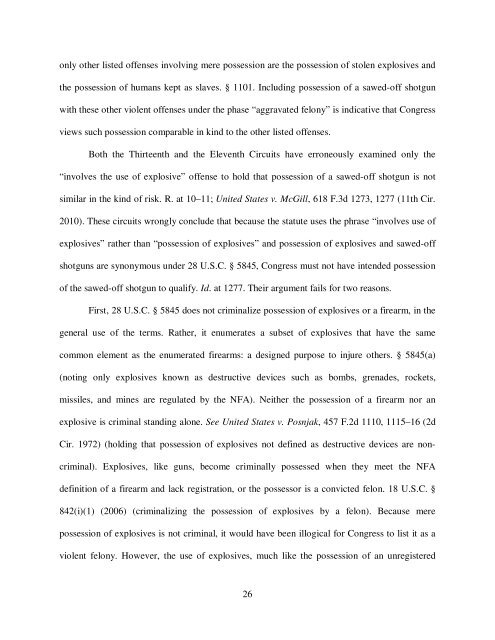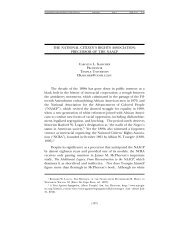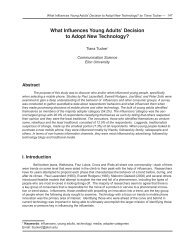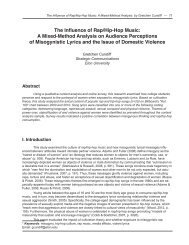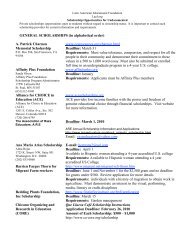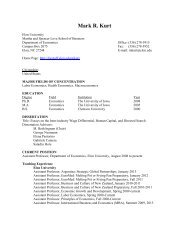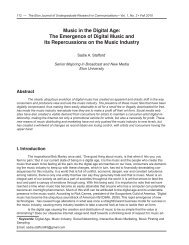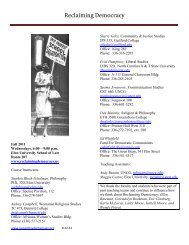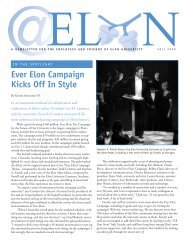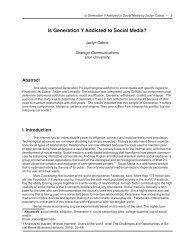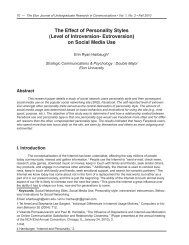In the Supreme Court of the United States In the Supreme Court of ...
In the Supreme Court of the United States In the Supreme Court of ...
In the Supreme Court of the United States In the Supreme Court of ...
You also want an ePaper? Increase the reach of your titles
YUMPU automatically turns print PDFs into web optimized ePapers that Google loves.
only o<strong>the</strong>r listed <strong>of</strong>fenses involving mere possession are <strong>the</strong> possession <strong>of</strong> stolen explosives and<br />
<strong>the</strong> possession <strong>of</strong> humans kept as slaves. § 1101. <strong>In</strong>cluding possession <strong>of</strong> a sawed-<strong>of</strong>f shotgun<br />
with <strong>the</strong>se o<strong>the</strong>r violent <strong>of</strong>fenses under <strong>the</strong> phase “aggravated felony” is indicative that Congress<br />
views such possession comparable in kind to <strong>the</strong> o<strong>the</strong>r listed <strong>of</strong>fenses.<br />
Both <strong>the</strong> Thirteenth and <strong>the</strong> Eleventh Circuits have erroneously examined only <strong>the</strong><br />
“involves <strong>the</strong> use <strong>of</strong> explosive” <strong>of</strong>fense to hold that possession <strong>of</strong> a sawed-<strong>of</strong>f shotgun is not<br />
similar in <strong>the</strong> kind <strong>of</strong> risk. R. at 10–11; <strong>United</strong> <strong>States</strong> v. McGill, 618 F.3d 1273, 1277 (11th Cir.<br />
2010). These circuits wrongly conclude that because <strong>the</strong> statute uses <strong>the</strong> phrase “involves use <strong>of</strong><br />
explosives” ra<strong>the</strong>r than “possession <strong>of</strong> explosives” and possession <strong>of</strong> explosives and sawed-<strong>of</strong>f<br />
shotguns are synonymous under 28 U.S.C. § 5845, Congress must not have intended possession<br />
<strong>of</strong> <strong>the</strong> sawed-<strong>of</strong>f shotgun to qualify. Id. at 1277. Their argument fails for two reasons.<br />
First, 28 U.S.C. § 5845 does not criminalize possession <strong>of</strong> explosives or a firearm, in <strong>the</strong><br />
general use <strong>of</strong> <strong>the</strong> terms. Ra<strong>the</strong>r, it enumerates a subset <strong>of</strong> explosives that have <strong>the</strong> same<br />
common element as <strong>the</strong> enumerated firearms: a designed purpose to injure o<strong>the</strong>rs. § 5845(a)<br />
(noting only explosives known as destructive devices such as bombs, grenades, rockets,<br />
missiles, and mines are regulated by <strong>the</strong> NFA). Nei<strong>the</strong>r <strong>the</strong> possession <strong>of</strong> a firearm nor an<br />
explosive is criminal standing alone. See <strong>United</strong> <strong>States</strong> v. Posnjak, 457 F.2d 1110, 1115–16 (2d<br />
Cir. 1972) (holding that possession <strong>of</strong> explosives not defined as destructive devices are non-<br />
criminal). Explosives, like guns, become criminally possessed when <strong>the</strong>y meet <strong>the</strong> NFA<br />
definition <strong>of</strong> a firearm and lack registration, or <strong>the</strong> possessor is a convicted felon. 18 U.S.C. §<br />
842(i)(1) (2006) (criminalizing <strong>the</strong> possession <strong>of</strong> explosives by a felon). Because mere<br />
possession <strong>of</strong> explosives is not criminal, it would have been illogical for Congress to list it as a<br />
violent felony. However, <strong>the</strong> use <strong>of</strong> explosives, much like <strong>the</strong> possession <strong>of</strong> an unregistered<br />
26


